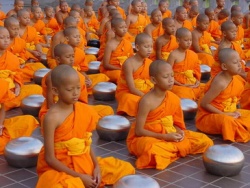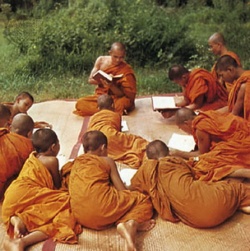Difference between revisions of "Buddhist Education"
m (Adminos moved page A Buddhist Education to Buddhist Education) |
|||
| Line 1: | Line 1: | ||
| − | [[File: | + | [[File:-lent-.jpg|thumb|250px|]][[File:5-tibetan book.jpg|thumb|250px|]][[File:Taipfupil.jpg|thumb|250px|]][[File:Tripitaka-78.jpg|thumb|250px|]] |
| − | + | [[Buddhist]] [[education]] as an off shert of the later {{Wiki|Vedic}} period came into [[existence]] in the fifth century. B.C [[Brahmans]] deprived the common [[people]] of their right to [[education]]. Hence, that [[emergence]] of [[Buddhism]] granted the [[people]] to obtain [[education]] & practice their [[religion]] themselves. Thus the [[Buddhist system of education]] was evolved as a {{Wiki|reaction}} against to [[Brahmanic]] system. [[Lord Buddha]], the founder of [[Buddhism]] did not write any [[book]] himself. His followers made the collection of his preachings too years after his [[death]]. | |
| − | |||
| − | [[File: | ||
| − | |||
| − | [[ | ||
| − | |||
| − | + | ===Basic [[Truths]] or {{Wiki|principles}} of [[Buddhism]]=== | |
| − | + | # [[Suffering]]: [[life]] is full of sorrows, suffraigs & [[mental]] anguish. | |
| + | # [[Cause of suffering]]: These [[sufferings]] have [[causes]]. | ||
| + | # Elimination of [[suffering]]: It is possible to end the [[sufferings]] we have. | ||
| + | # Ways of elimination of [[sufferings]]: Ways should be discovered to eliminate the [[sufferings]]. To be completely free from [[sufferings]] one need to stop the cycle of [[birth]] & death-rebirth. | ||
| − | + | ===Salient features of [[Buddhist]] [[education]]=== | |
| + | ====Objectives (Aims are [[ideas]] of [[education]])==== | ||
| − | + | # The following steps of Ashtang became the height [[objective]], goals, or [[aim]] of [[education]]. | |
| + | # [[Right knowledge]]: The first & formost [[aim]] of [[education]] is to provide man with the [[right knowledge]] became & the [[ignorance]] of the [[self]]. | ||
| + | # We develop false [[perception]] or [[knowledge]] of material [[world]]. This right [[perception]] which enables man to [[recognize]] the {{Wiki|real}} [[nature]] of the [[world]] is called [[right knowledge]]. | ||
| + | # Right will:- Mere getting of [[right knowledge]] does not end the [[sufferings]] unless there is will to bad a [[life]] in accordance with this [[knowledge]]. | ||
| + | # [[Right speech]]:- Another important quality of an educated [[person]] is that he should have a control over his [[speech]]. His [[speech]] should be balanced & appropriate to the occasion. He should not talk to others. He should not be very talkative. | ||
| + | # [[Right actions]] conduct:- The [[action]] of an educated [[person]] are well controlled & good to others. The right will & [[right speech]] are very helpful in [[right actions]]. The [[right action]] conduct comprises non - {{Wiki|violence}}, non - [[stealing]], [[truth]] & control over scenes. | ||
| + | # Right vocation:- The [[life]] of an educated [[person]] should be so [[transformed]] that he feeds himself & his family only by adopting right & good means of [[livelihood]]. The choice of vocation depends upon his own dispositions, interest's, skills & understandings. | ||
| + | # Right exercise:- We are still liable to deviate from our right [[path]] of our [[life]], became of old Sanskar's which we are either born with or they [[gathered]] as a result of past [[experiences]]. | ||
| + | # [[Right memory]]:- The educated [[person]] keeps recalling what he has learned, with a [[view]] that he might not relapse into [[ignorance]] again. | ||
| + | # [[Right concentration]]:- When a [[person]] develops the above seven traits of [[personality]] he qualifies himself to enter into the state of [[right meditation]], the first pre - requiste to attain [[nirvana]], the [[Wikipedia:Absolute (philosophy)|ultimate]] goal of [[human]] [[life]]. | ||
| − | + | ====Method of talking==== | |
| − | + | # [[Verbal]] or oral method:- During this period [[education]] was [[essentially]] [[verbal]], as it was during the {{Wiki|Vedic}} age. Lecture can be given simultaneously to a number of students. | |
| + | # Question answer method:- This method has also been introduced. | ||
| + | # [[Discussion]] & [[debates]]:- These where organized to bring about proper [[education]]. Students where trained in the [[art]] of [[debating]] from the very beginning of their {{Wiki|academic}} career. | ||
| + | # Interpretation method:- In interpretation, {{Wiki|learning}} material [[subject]] matter or [[knowledge]] was presented in the [[form]] of [[Sutras]] & are interpreted by a [[teacher]]. The student could raise their [[doubts]] in between & [[teacher]] ramous these [[doubts]]. | ||
| + | # Inductive method:- It was also used & the {{Wiki|intellect}} of pupils was trained through it. | ||
| + | # Extension lecture method. | ||
| + | # [[Education]] through tours. | ||
| + | # Direct method. | ||
| + | # Periodical gatherings. | ||
| + | # [[Meditation]] method. | ||
| + | # Theroitent & pradicut method. Etc. | ||
| − | + | ==={{Wiki|Curriculum}}=== | |
| + | ====[[Education]] was derived into two stages==== | ||
| − | + | * Primary [[Education]]. | |
| + | * Higher [[Education]]. | ||
| − | + | * '''Primary [[Education]]''':- It aimed at [[teaching]], reading, [[writing]], & {{Wiki|arithmetic}}. There was great emphasis on an {{Wiki|ideal}} [[life]] in accordance with [[Buddhist]] {{Wiki|principles}}. The jetkas stories indicate that during the [[Buddhist]] period, primary [[education]] took the [[form]] of [[worldly]] haxcbsvdc [[education]]. | |
| + | * '''Higher [[education]]''':- At the higher stage students study a variety of [[subjects]] such as {{Wiki|literature}}, [[medicine]], law, [[philosophy]], [[religion]], politics, [[astrology]], & {{Wiki|military}} [[science]]. | ||
| − | + | '''[[Discipline]]''':- There was a rigorous [[discipline]] which the students had to [[observe]]. Students where expected to [[live]] an {{Wiki|ideal}} [[life]] in pursuit of [[Buddha's]] eight - fold [[path]]. He was to [[observe]] ten rules:- | |
| + | |||
| + | # Not to kill any [[living being]]. | ||
| + | # Not to steal. | ||
| + | # Not to tell a lie. | ||
| + | # Not to eat at improper [[time]]. | ||
| + | # Not to take intoxicant. | ||
| + | # Not to speak ill of any [[body]]. | ||
| + | # Not to take [[interest]] in {{Wiki|music}}, dance, play. Etc. | ||
| + | # Not to use things soft & comfortable bed, consmeties & luxurious things. | ||
| + | # [[Observe]] [[celibacy]] & to be free from [[impurity]] of [[character]]. | ||
| + | |||
| + | '''Women [[Education]]''':- [[Buddha]] was opposite to the [[education]] of women. He held that women had great responsibilities at home. So, women where not allowed to admission in [[Buddhist]] [[monasteries]]. | ||
| − | |||
| − | |||
| − | |||
{{R}} | {{R}} | ||
| − | [http:// | + | [http://gcoekmr.org/Buddhist-Education.aspx gcoekmr.org] |
| − | + | ||
[[Category:Buddhist Education]] | [[Category:Buddhist Education]] | ||
Revision as of 09:38, 31 October 2013
Buddhist education as an off shert of the later Vedic period came into existence in the fifth century. B.C Brahmans deprived the common people of their right to education. Hence, that emergence of Buddhism granted the people to obtain education & practice their religion themselves. Thus the Buddhist system of education was evolved as a reaction against to Brahmanic system. Lord Buddha, the founder of Buddhism did not write any book himself. His followers made the collection of his preachings too years after his death.
Basic Truths or principles of Buddhism
- Suffering: life is full of sorrows, suffraigs & mental anguish.
- Cause of suffering: These sufferings have causes.
- Elimination of suffering: It is possible to end the sufferings we have.
- Ways of elimination of sufferings: Ways should be discovered to eliminate the sufferings. To be completely free from sufferings one need to stop the cycle of birth & death-rebirth.
Salient features of Buddhist education
Objectives (Aims are ideas of education)
- The following steps of Ashtang became the height objective, goals, or aim of education.
- Right knowledge: The first & formost aim of education is to provide man with the right knowledge became & the ignorance of the self.
- We develop false perception or knowledge of material world. This right perception which enables man to recognize the real nature of the world is called right knowledge.
- Right will:- Mere getting of right knowledge does not end the sufferings unless there is will to bad a life in accordance with this knowledge.
- Right speech:- Another important quality of an educated person is that he should have a control over his speech. His speech should be balanced & appropriate to the occasion. He should not talk to others. He should not be very talkative.
- Right actions conduct:- The action of an educated person are well controlled & good to others. The right will & right speech are very helpful in right actions. The right action conduct comprises non - violence, non - stealing, truth & control over scenes.
- Right vocation:- The life of an educated person should be so transformed that he feeds himself & his family only by adopting right & good means of livelihood. The choice of vocation depends upon his own dispositions, interest's, skills & understandings.
- Right exercise:- We are still liable to deviate from our right path of our life, became of old Sanskar's which we are either born with or they gathered as a result of past experiences.
- Right memory:- The educated person keeps recalling what he has learned, with a view that he might not relapse into ignorance again.
- Right concentration:- When a person develops the above seven traits of personality he qualifies himself to enter into the state of right meditation, the first pre - requiste to attain nirvana, the ultimate goal of human life.
Method of talking
- Verbal or oral method:- During this period education was essentially verbal, as it was during the Vedic age. Lecture can be given simultaneously to a number of students.
- Question answer method:- This method has also been introduced.
- Discussion & debates:- These where organized to bring about proper education. Students where trained in the art of debating from the very beginning of their academic career.
- Interpretation method:- In interpretation, learning material subject matter or knowledge was presented in the form of Sutras & are interpreted by a teacher. The student could raise their doubts in between & teacher ramous these doubts.
- Inductive method:- It was also used & the intellect of pupils was trained through it.
- Extension lecture method.
- Education through tours.
- Direct method.
- Periodical gatherings.
- Meditation method.
- Theroitent & pradicut method. Etc.
Curriculum
Education was derived into two stages
- Primary Education:- It aimed at teaching, reading, writing, & arithmetic. There was great emphasis on an ideal life in accordance with Buddhist principles. The jetkas stories indicate that during the Buddhist period, primary education took the form of worldly haxcbsvdc education.
- Higher education:- At the higher stage students study a variety of subjects such as literature, medicine, law, philosophy, religion, politics, astrology, & military science.
Discipline:- There was a rigorous discipline which the students had to observe. Students where expected to live an ideal life in pursuit of Buddha's eight - fold path. He was to observe ten rules:-
- Not to kill any living being.
- Not to steal.
- Not to tell a lie.
- Not to eat at improper time.
- Not to take intoxicant.
- Not to speak ill of any body.
- Not to take interest in music, dance, play. Etc.
- Not to use things soft & comfortable bed, consmeties & luxurious things.
- Observe celibacy & to be free from impurity of character.
Women Education:- Buddha was opposite to the education of women. He held that women had great responsibilities at home. So, women where not allowed to admission in Buddhist monasteries.



